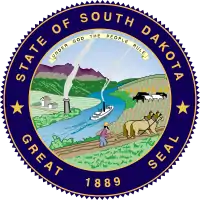List of National Historic Landmarks in South Dakota
The List of National Historic Landmarks in South Dakota contains the landmarks designated by the U.S. Federal Government for the U.S. state of South Dakota.
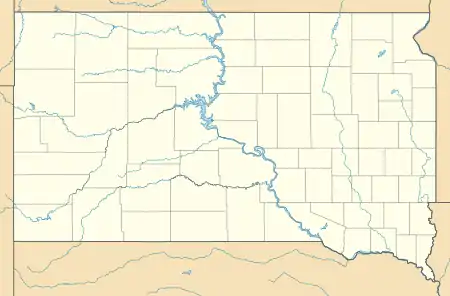
There are 16 National Historic Landmarks (NHLs) in South Dakota, one of which is shared with Iowa and listed by the National Park Service as primarily in that state. They have been designated in 13 of South Dakota's 66 counties. Most are along rivers, long the chief areas of human settlement in this arid place.
Current NHLs
| [1] | Landmark name | Image | Date designated[2] | Location | County | Description |
|---|---|---|---|---|---|---|
| 1 | Arzberger Site | 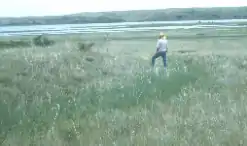 Arzberger Site |
July 19, 1964 (#66000715) |
Pierre Address Restricted |
Hughes | Archaeological site of a fortified 15th-century Native American village, believed to be Arikara. |
| 2 | Battle Mountain Sanitarium, National Home for Disabled Volunteer Soldiers | 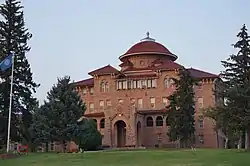 Battle Mountain Sanitarium, National Home for Disabled Volunteer Soldiers |
June 17, 2011 (#11000561) |
Hot Springs 43°26′11″N 103°28′44″W |
Fall River | Facility built in 1907 to treat veterans suffering rheumatism and/or tuberculosis |
| 3 | Bear Butte |  Bear Butte |
December 21, 1981 (#73001746) |
Sturgis 44°28′33″N 103°25′37″W |
Meade | |
| 4 | Blood Run Site |  Blood Run Site |
May 22, 1970 (#70000246) |
Shindler, South Dakota and Granite, Iowa 43°28′N 96°35′W |
Lincoln, South Dakota and Lyon, Iowa | A Native American archaeological site, extending into Iowa |
| 5 | Bloom Site | 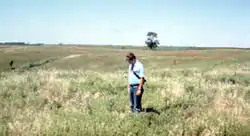 Bloom Site |
July 19, 1964 (#66000714) |
Bloom Address Restricted |
Hanson | This fortified archaeological site preserves the remains of about 25 rectangular houses dating to c. 1000 CE. The site also once contained several burial mounds, which were later destroyed by cultivation. The site was perhaps occupied by ancestors of the Mandan. |
| 6 | Crow Creek Site | 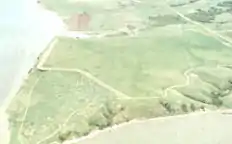 Crow Creek Site |
July 19, 1964 (#66000710) |
Chamberlain 43°58′48″N 99°19′54″W |
Buffalo | Site of a prehistoric Native American massacre circa 1325. |
| 7 | Deadwood Historic District | Deadwood Historic District |
July 4, 1961 (#66000716) |
Deadwood 44°22′19″N 103°44′00″W |
Lawrence | Historic mining town. |
| 8 | Fort Pierre Chouteau Site | 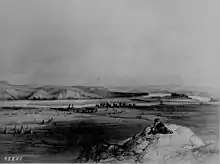 Fort Pierre Chouteau Site |
July 17, 1991 (#76001756) |
Fort Pierre 44°23′21″N 100°23′28″W |
Stanley | |
| 9 | Fort Thompson Mounds | 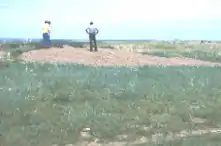 Fort Thompson Mounds |
July 19, 1964 (#66000711) |
Fort Thompson[3] 44°02′00″N 99°22′40″W |
Buffalo | A complex of many burial mounds along the Missouri River |
| 10 | Frawley Ranch | 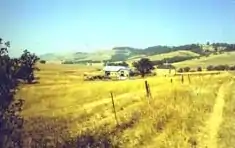 Frawley Ranch |
May 5, 1977 (#74001893) |
Spearfish 44°28′30″N 103°42′38″W |
Lawrence | |
| 11 | Langdeau Site | 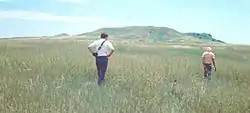 Langdeau Site |
July 19, 1964 (#66000717) |
Lower Brule Address Restricted |
Lyman | |
| 12 | Mitchell Site |  Mitchell Site |
July 19, 1964 (#66000712) |
Mitchell 43°44′30″N 98°02′02″W |
Davison | Archaeological site of a prehistoric Mississippian culture village. Open to the public. |
| 13 | Molstad Village | 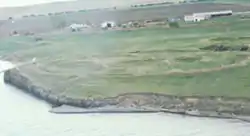 Molstad Village |
July 19, 1964 (#66000713) |
Mobridge 45°27′25″N 100°21′15″W |
Dewey | A fortified prehistoric village of five circular house rings enclosed by a ditch comprises this archaeological site. It represents a transitional period as the Mandan, Hidatsa, and Arikara peoples arose from the mixing of Central Plains and Middle Missouri cultural traits. |
| 14 | Vanderbilt Archeological Site | February 18, 1997 (#97000342) |
Pollock Address Restricted |
Campbell | ||
| 15 | Verendrye Site | 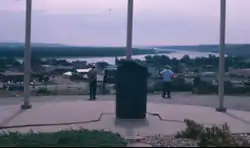 Verendrye Site |
July 17, 1991 (#74001899) |
Fort Pierre 44°21′20″N 100°22′43″W |
Stanley | |
| 16 | Wounded Knee Battlefield | 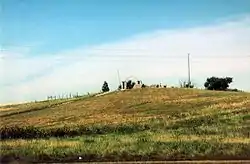 Wounded Knee Battlefield |
December 21, 1965 (#66000719) |
Pine Ridge Indian Reservation 43°08′28″N 102°21′46″W |
Shannon |
Historic areas in the United States National Park System
National Historic Sites, National Historic Parks, National Memorials, and certain other areas listed in the National Park system are historic landmarks of national importance that are highly protected already, often before the inauguration of the NHL program in 1960, and are often not also named NHLs per se. Two additional South Dakota sites have national historical importance and have been designated as National Historic Site and as a National Memorial by the National Park System.
| Monument name[4] | Image | Established[4] | Locality[4][5] | County[4] | Description[5] | |
|---|---|---|---|---|---|---|
| 1 | Minuteman Missile National Historic Site |  |
December 29, 1999 | Jackson and Pennington | ||
| 2 | Mount Rushmore National Memorial | 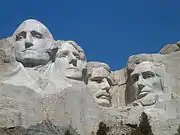 |
March 3, 1925 | Black Hills | Pennington |
References
- Numbers represent an alphabetical ordering by significant words. Various colorings, defined here, differentiate National Historic Landmarks and historic districts from other NRHP buildings, structures, sites or objects.
- The eight-digit number below each date is the number assigned to each location in the National Register Information System database, which can be viewed by clicking the number.
- Neuman, Robert W. "Projectile Points from Preceramic Occupations Near Fort Thompson, South Dakota: A Preliminary Report". Plains Anthropologist 9.25 (1964): 173-189: 176.
- National Park Service (June 2011). "National Historic Landmarks Survey: List of National Historic Landmarks by State" (PDF). Archived from the original (PDF) on 2011-11-05. Retrieved 2011-07-04..
- National Park Service. "National Historic Landmark Program: NHL Database". Archived from the original on 2004-06-06. Retrieved 2007-09-22.
